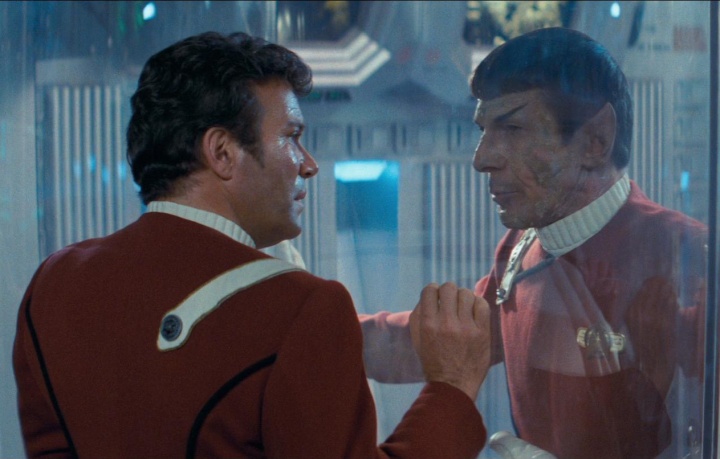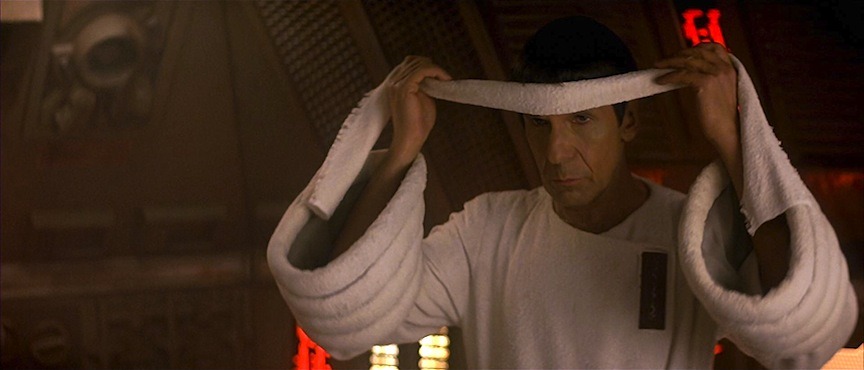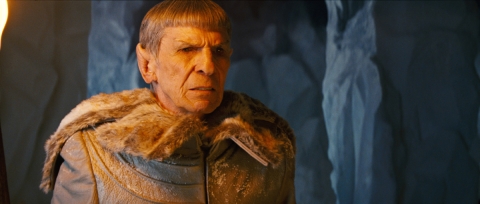Lenny And Bill
William Shatner has written a fair number of books about his life dealing one way or another with his years as Captain Kirk: Star Trek Memories, Star Trek Movie Memories, Up Till Now: The Autobiography, Get A Life!, Shatner Rules: Your Guide To Understanding The Shatnerverse And The World At Large. You'd figure he's wrung that rag dry.
But this year he's come up with a new twist. Instead of writing another remembrance of his life, he's written a memoir of Leonard Nimoy's life, Leonard: My Fifty-Year Friendship With A Remarkable Man. Mind you, Nimoy wrote two memoirs himself--I Am Not Spock and I Am Spock, but there seems to be no sating Star Trek fans. Including me, I guess, since I just read Leonard, like I read all those others.
The two top men on the Enterprise had a lot in common. Both were born in 1931 to lower-middle class Jewish immigrant families. And both were--to the surprise of their parents--bitten by the acting bug at a young age. It's here their histories start to diverge. Shatner, with his manly good looks, was soon on a different track from Nimoy--a star track, if you will. By the mid-60s, he was a Broadway leading man, regularly appeared in major guest shots on TV, and had a decent movie career going. Nimoy spent years struggling to find work and eventually carved out a career as a character actor. His dark, offbeat looks meant he was often cast as a villain or a foreigner. And up until he got the role of Spock on Star Trek, he'd never had an acting job that lasted more than two weeks.
As Star Trek fans know, producer Gene Roddenberry cast Nimoy as Spock in the original pilot, playing against Jeffrey Hunter as Captain Pike. That pilot was rejected, but NBC paid for another, this time with Shatner as the hero Captain Kirk. In fact, Nimoy was one of the few who survived from the original pilot.
The new cast worked well together, and Kirk and Spock had a great chemistry. Shatner was such an outgoing, energetic personality that it allowed Spock to be more internal and contemplative (as opposed to Hunter, who gave a much more pensive performance, forcing Nimoy to be livelier). While Nimoy would become identified with Spock, he wasn't much like the character--not at first, anyway. He was a passionate man, enthusiastic about many things. Eventually though, according to Shatner, Nimoy did take on some of the characteristics of Spock. Maybe it was because so many started treating him as if he were Spock. (Young scientists would love to talk about their latest projects with Nimoy, who'd usually reply "you're on the right track.")
The two also approached acting differently. They were both serious about their careers, and, in their early years, rarely turned down jobs. But Shatner believed in learning his lines, figuring the point of the scene, and jumping in. Nimoy was a big believer in the Method. He'd study the script closely, try to fully understand the backstory of the character, the subtext of the scenes and express the emotions of the moment as honestly as possible. Ironically, Spock went against much of his experience--he was used to bringing out the emotions of the character, and here was a case of a super-logical being who had to hold them all in.
The show got on the air and, to everyone's surprise, Spock got the most attention. This was not a pleasant surprise to Kirk, who, after all, was the star, and didn't like being upstaged. There was even a to-do about a photographer who came in to photograph Nimoy going through his makeup ritual, and Shatner--who had a clause in his contract where he controlled any photography on the set--shutting it down, setting up a stand-off. Though we hear Shatner's side of the story, it's hard to believe he wasn't jealous. And what probably drove him most crazy was that Nimoy became the sex symbol on the show.
Nimoy deserved all the attention. Shatner is fine at what he does, but Spock is the best and most original thing about the show. And the character probably wouldn't have worked without Nimoy. He took Spock seriously, when the Vulcan could have easily been turned into something silly or campy. He also added a lot by keeping the character consistent and putting in touches of his own--such as the Vulcan nerve pinch (because hitting people was too violent), the mind meld and the split-fingered Vulcan salute. (Though it was Theodore Sturgeon who wrote "Live Long And Prosper.")
For the first time in his career, Nimoy had not just a steady job, but fame. (Not much money yet--that would come later). He was nominated for Emmys three consecutive years. But he was disappointed at how shabbily he was treated by the producers and the network, who denied him opportunities to make more money while exploiting him as much as they could.
Star Trek had an intense following during its run, but was never a hit. In its three years on the air it was always on the edge of cancelation. And when it ended, the cast figured it would probably be like so many other jobs--you say goodbye to all these people you've been spending so much time with, probably never to see them again.
At this point, there was at best a minor friendship between Nimoy and Shatner. After a shaky first year, they'd gotten closer--and it was their dynamic that made the show what it is. But it was only later they became best friends.
Because after Star Trek was canceled, the oddest thing happened. It became gigantic in syndication, much bigger than it had been before. The fans wouldn't let it go, even though Nimoy and Shatner had moved on. In fact, immediately after the show left the air, Nimoy walked across the lot and worked for two years as a regular on Mission: Impossible (and made some real money for a change).
Star Trek conventions started in the 70s and drew huge crowds. They invited the stars and anyone else related to the show. The biggest "gets," of course, were Shatner and Nimoy, and they were both happy enough to drop in and enjoy the adulation and the paycheck. (The rest of the cast were probably even happier about the money, though they got less than the two stars.) The two did enough panels together over the years that they finally had a chance to get to know each other. This is when they truly became close.
Shatner learned something. During the original series, Nimoy had become an alcoholic--a functioning alcoholic, but an alcoholic nevertheless. He came prepared, knew his lines, but as soon as shooting was done, he'd have his first drink, and keep drinking till he passed out. It took him years until he was prepared to shake the addiction. (Later, against Nimoy's warning, Shatner married an alcoholic. It was a tough road, and she eventually died, drowning in a pool.)
Now that Nimoy was in demand, he got to do the things he always wanted. In particular, he spent a lot of time in the theatre, even if the pay wasn't as good. He did numerous dramas and musicals, as well as a one-man show he wrote about Vincent Van Gogh. (Nimoy had, I suppose, a passable baritone. Let's put it this way--he sang better than Shatner.)
In the late 70s, with Star Trek mania only growing, there was a plan to bring the show back to TV. (There already had been an animated show for one season, featuring the voices of the original cast, but that wasn't quite the same thing.) Then Star Wars became the biggest hit of all time and Paramount, figuring it had a hot property on its hands, planned a blockbuster movie.
The first Star Trek film was a disappointment artistically but made plenty of money, so the studio made another. Luckily, Star Trek II: The Wrath Of Khan was a good film as well as a hit, and the series continued.
Nimoy wasn't sure he wanted to get aboard to begin with--his days as Spock were behind him, he thought. And when his character was killed off in the second film, that looked like it was truly over. To get him back, Paramount let him direct. He did a pretty good job with the third film, and knocked it out of the park with the fourth, which was the biggest hit of the series. (Shatner directed the fifth film, which no one liked.)
But Star Trek wasn't yet done with Nimoy. There was the sixth and last film in the series, a guest shot on the Next Generation TV series, and appearances in the updated J. J. Abrams Star Trek film series, not to mention voicework as Spock (or close to it) on The Simpsons and The Big Bang Theory.
In general, Nimoy was one of those people who always had to be busy. And not just as an actor and director. He was always exploring, looking for creative ways to express himself. He became an accomplished photographer, for instance, and also published several books of poetry.
Eventually, thirty years of heavy smoking caught up with him and he died of complication from COPD a year ago. Alas, Shatner and Nimoy, who had become the closest of friends, did have a slight falling out in the final years. But they still loved each other, and now we have this book as a testament.









2 Comments:
I saw Nimoy in Equus on Broadway in the 70s. He was the doctor, and I thought he brought a lot of Spock to the character.
What does Shatner say in the book about the latter years falling out? I assume he doesn't suggest he missed Nimory's funeral as a result of it.
He only mentions the falling out in the last few pages, and it's more an unfortunate thing than something bigger. It doesn't have anything to do with his missing the funeral.
Post a Comment
<< Home